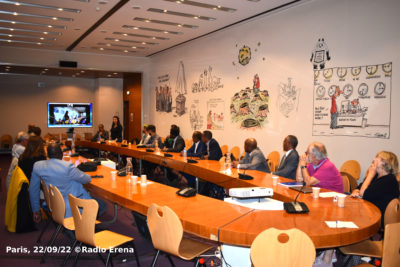
Radio Erena News 29 September 2022
In collaboration with the Municipality of Paris Radio Erena organized a panel discussion on the impact of the war in Northern Ethiopia on the freedom of press on the region.
The panel hosted Motoki Momo the East Africa representative of the Committee to Protect Journalists CPJ, who participated by video conference from Nairobi. Mohamed Alasbat, Sudanese exiled journalist and member of newly established Sudanese Journalists’ Association and journalists from Djibouti, Eritrea and NGOs representatives.
Speaking on the impact of the conflict in the past and during the conflict, Momo said the Horn of Africa has been marked as one the dangerous places for journalists and the war has complicated the existing situation. “CPJ has been recording cases of illegal arrests, imprisonment, forced exiled and killing of journalists in the Horn of Africa and has extended vital help to some of them.” Today, because of the war many journalists suffer from the dire situation at different levels, she said, citing examples of cases of some journalists.
Speaking in behalf of Radio Erena, Fathi Osman said that the conflict has created a dangerous situation for the most vulnerable group in Tigray: The Eritrean refugees. “We have been heavily impacted by the blackout and ban of journalists’ reporting, in addition to the difficulty of obtaining confirmed news on the situation of the refugees who became victims of all the conflict parties from Eritrean troops, to the Ethiopian Federal army and the Tigrayans troops. This was one of the imminent challenges of covering the conflict in the region. “Some journalists couldn’t report because of the censorship, despite of abundance of information, others, on the other hand, couldn’t lay hand on information.”
Highlighting the impact of the conflict on Sudanese journalists, Alasbat said that the Sudanese journalists were not allowed to travel the Sudanese-Ethiopian border without permission form the Sudanese Military Intelligence. Some journalists were also banned from visiting the Ethiopian refugees camps, some of these were foreign correspondents.
Despite the restrictions, he said, the Sudanese journalists managed to visit the refugees’ camps and reported widely on the abuses suffered by civilians.
After the presentations, a session of question and answer and debate was open. At the end of the panel, the journalists recommended the establishment of a Horn of Africa journalist network that may work as base for future professional cooperation and suggested that Radio Erena serve as Launchpad for this proposed network.
